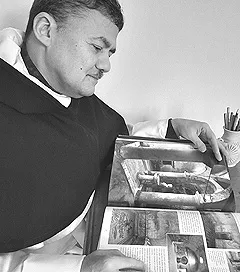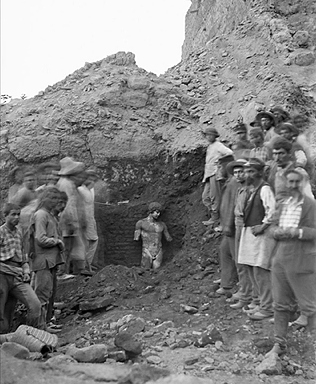The Delphi Antinous - 130-Year Anniversary
-
 Theo Faurez
Theo Faurez
| Saturday 13th of July 2024 12:47:04 PM (UTC)

A life-size marble statue of Antinous was unearthed, literally, in Delphi on 13 July 1894 – 130 years ago – by a team from the École française d'Athènes. (Fun fact: Antinous died in the year A.D. 130) To the archaeological team's stupefaction, it was found upright and almost intact, pedestal included. How was this possible?
The most plausible explanation for the state in which the statue remained for centuries seems to me to be this: it was not left there to endure the ravages of time, but was deliberately buried. Hidden, in a word. Four points make me lean towards this hypothesis.
1. To believe the statue was left to the ravages of time would mean believing that the statue would have been covered in dust and debris millimetre by millimetre over decades, to be completely submerged after generations if not centuries; that during this time no one would have touched it, vandalised it, stolen or plundered it; that it would have been ignored by Goth invaders and Christian fanatics: all this defies credibility.
2. Being buried upright where it stood is compatible with a desire to protect the statue from the ravages of time and from the aforementioned barbarians and fanatics.
3. A desire to protect it is compatible with contemporary accounts according to which Antinous was an ephebe of extraordinary beauty, as were his representations (statues, reliefs, paintings, coinage, portraits), all faithful to the original.
4. The unforeseen popularity of this deified youth following his tragic death has been attributed to political brown-nosing: please the Emperor Hadrian and gain kudos. Such an attitude applies only to those who play at politics. For the average Greek and Roman, physical grace was an attribute specific to the immortals. Beauty was a stamp of divinity. The universal popularity of Antinous -- a deified mortal, one can never overemphasise this fact -- testifies above all to a belief that this new god was within human reach, unlike the traditional gods of Olympus. Locals were not about to let themselves be robbed of so potent a helper by any gang of thugs, foreign or Greek.
One may admire this Antinous whose mien is both happy and meditative at the archaeological museum of Delphi (Greece).
Start the conversation
Become a member of TxtTale to start commenting.
Already a member?
